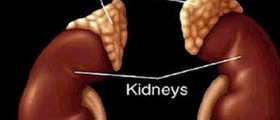
Endocrine system of the body
The endocrine system is important for numerous different functions in the human body as it affects almost every organ, tissue and cell inside it. It is of utmost importance for the regulation of the reproductive processes, sexual function, metabolism, tissue function, development, growth and mood. The nervous system controls the faster processes such as the body movement and breathing, while the endocrine system takes care of all slower processes. These systems usually need to cooperate so that the entire body can function properly. The essential parts of the endocrine system are different types of glands and hormones. Glands are groups of cell which produce and secrete different types of chemicals. Hormones are in charge of transferring information between the cells in the human body. Each type of hormone affects only certain types of cells. Some glands only secrete their chemicals in specific areas of the body. The most important glands in the human body include reproductive glands, pineal body, adrenal glands, thyroid, parathyroids, pituitary gland and hypothalamus. The inner part of the adrenal gland is referred to as the adrenal medulla and it is in charge of different types of catecholamines such as epinephrine. Epinephrine is also referred to as adrenaline and it is in charge of increasing the heart rate and blood pressure once the body gets exposed to stress. The outer part of the adrenal gland is called the adrenal cortex and it is in charge of production of corticosteroids. These hormones are in charge of sexual function, sexual development, the immune system, metabolism, the body’s response to stress and a healthy balance of water and salt inside the body. The thyroid gland is located in the lower neck, more precisely in its front part. It looks like a butterfly and is in charge of the production of triiodothyronine and thyroxine, which are thyroid hormones. They are in charge of controlling the rate at which the cells burns fuels obtained from food in order to produce precious energy. The release and the production of these hormones is regulated by thyrothropin, which is a certain type of hormone released by the pituitary gland. The thyroid hormones are also of utmost importance in the normal growth and development of bones, the brain and the nervous system. Parathyroids are four very small glands attached to the main thyroid gland and they function together. They are in charge of the production of the hormone called parathyroid. This hormone is of utmost importance when it comes to regulating the levels of calcium in the blood. One of the most important glands in the human body is the pituitary gland. This gland is very small and can be found at the very base of the brain. Sometimes it is referred to as the master gland. Different factors such as changes in the seasons or emotions may affect the production of the pituitary hormones. There are two main parts of the pituitary gland and those are the posterior lobe and the anterior lobe. The posterior lobe is in charge of production of an antidiuretic hormone and the oxytocin. These hormones are in charge of controlling the balance of water in the body and triggering the contractions of the uterus in a pregnant woman. The anterior lobe of the pituitary gland is in charge of regulating the reproductive glands, the adrenal glands and the thyroid. It also produced several important hormones such as corticotrophin, thyrotropin, prolactin and the growth hormone. Corticotropin is in charge of stimulating the adrenal glands, thyrotropin is in charge of stimulating the activity of the thyroid gland, prolactin is in charge of stimulating the milk production in pregnant women and the growth hormone is of utmost importance for the normal growth of different body tissues. The pituitary gland also produces endorphins. These types of hormones are in charge of reducing the pain and acting on the nervous system. The master gland is also in charge of controlling the ovulation and the menstrual cycles of a woman and also of signaling the reproductive glands to make sex hormones. The hypothalamus is a certain type of gland which can be found at the lower central part of the brain and it actually represents the main link between the nervous and the endocrine system. It contains certain nerve cells which are in charge of regulating the activity of the pituitarygland.
Function of the liver
The liver is the largest organ in the human body and it can also be considered as a gland. This is due to the fact that it secretes bile. It weighs about 3.5 pounds and it measures about 6.5 inches vertically and 8 inches horizontally. It is commonly 4.5 inches thick. It can be found in the upper right part of the abdomen, just under the diaphragm. The liver produces different types of important proteins, deals with the fats, metabolizes and stores carbohydrates, secretes the bile, eliminates all potentially harmful biochemical products and detoxifies the body.











-In-Adults_f_280x120.jpg)


-In-Infants-And-Older-Children_f_280x120.jpg)

Your thoughts on this
Loading...